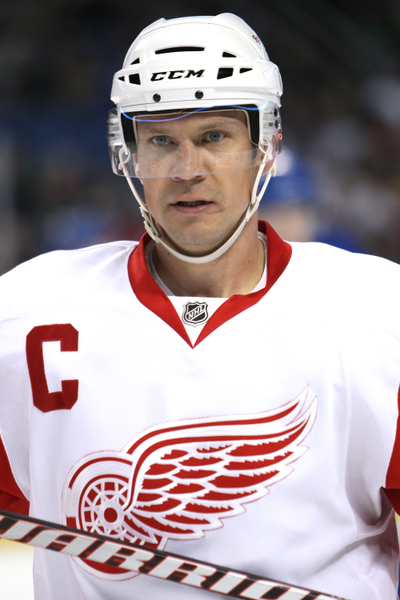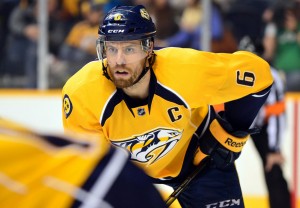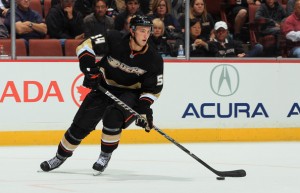
“Lots of defenseman are good at some elements of the game, but precious few can do it all. So when you find a guy who can be counted on to play a shutdown role, kill penalties, play the point on the power play and contribute offensively, you grab him. Players like that, guys who play nearly 30 minutes a game, can transform the win-loss record of a team more than any other players…without even being noticed.”
That’s Bob McCown’s take from his book, The 100 Greatest Hockey Arguments, on what type of player is most valuable to a hockey team – the franchise defenseman. And I completely agree with him.
Omitting generational talents like Sidney Crosby or Steven Stamkos, no type of player can carry a team like a complete, do-it-all defenseman in the NHL. A dominant offensive player can make everyone around him better, but isn’t as valuable in the defensive third – third liners or defensive specialists are better players in these situations. A franchise goalie can put a team on his back, especially come playoff time, but they’re too reliant on their team to score at least a goal, which is never a guarantee no matter how many pucks they stop.
The consistency of a franchise defenseman is unparalleled. The truly elite are always on top of their game, night after night, season after season. Nicklas Lidstrom is a prime example of the franchise defenseman, who either won or was a runner-up for the Norris for a run of nine seasons. It’s no coincidence the Red Wings never missed the playoffs with Lidstrom in the lineup.
Looking closely at the Norris Trophy, there have only been 14 different players the past 30 seasons to win the top defenseman award. That shows the consistency of a high-end defenseman, and their unrivalled value to a club year in and year out.
Can teams win without a franchise defenseman?
It’s tough to win without a franchise defenseman. Really tough. Since the 1990 season, there are arguably only four Stanley Cup winners that didn’t have a go-to guy on the backend: the ’06 Hurricanes, the ’04 Lightning, the ’99 Stars (this is a stretch as Sergei Zubov was really good), and the ’93 Canadiens. Every other team to win a championship had a clear-cut, bona fide blueliner to play half of every game for the entire postseason.
Quickly examining the past few Stanley Cup champions, the Hawks were led by Duncan Keith in ’07, Zdeno Chara brought the Cup to Boston the next year, then it was L.A.’s Drew Doughty, followed by a Keith redux last year.

To highlight the premium clubs place on franchise defenseman, turn to Shea Weber. Weber is arguably the most complete defender in the game, which is why the Flyers sent an obscene $100M+ offer sheet for the Predators captain. A cash-conscience team like the Predators didn’t give a second thought to match as they recognize that with Weber, they can be competitive. Which they have been this season, despite the loss of ‘franchise player’ Pekka Rinne for the majority of the year due to an infection. In truth, the Predators have no business being even close to .500 with that offense, but take a look at the year Weber is having, and it’s clear why they ‘re still a decent team.
So, it’s possible to win without a number one defender…it’s just a lot more difficult, and the right combination of defensemen is needed, similar to the ’93 Canadiens.
So what about the Ducks?
This brings me to why I bring up the discussion in the first place – the Anaheim Ducks as elite contenders. Can they really compete come playoff time without a stud on the backend?

The answer for me is no. The last time the Ducks won in 2007, they had Scott Niedermayer and Chris Pronger. Two franchise defenseman. Hard to lose when you can have one or the other on the ice for virtually the entire 60 minutes. The ’14 Ducks’ backend is led by Cam Fowler and Francois Beauchemein, not exactly the names that pop up when you think ‘franchise defenseman’.
Don’t get me wrong, they are excellent players, and the Ducks defense as a whole have been greater than the sum of their parts. Fowler has taken positive steps toward being a high-end defender, but isn’t there yet. He just doesn’t impact the game as much as a Doughty or Keith despite playing in all situations. And sure Beauchemin is a rock behind his blue line, but isn’t much of a threat in the attacking third of the ice.
Consider the other teams in the Western conference. Every team considered to be a legitimate contender for a Cup run features a franchise defender. I’ve mentioned Doughty and Keith, yet there’s still Alex Pietrangelo on the Blues, San Jose has Dan Boyle, Minnesota paid a ton to get Ryan Suter, and every team is envious of Phoenix and the continued development of Oliver Ekman-Larsson. Only the Avalanche don’t have a franchise defenseman, but they aren’t considered true contenders – with one of the reasons being, ironically, that their back line is weak.
The Ducks have every other piece to the puzzle. They have their franchise forwards in Corey Perry and Ryan Getzlaf. They have scoring depth throughout their top-nine. They have a stud goalie in Jonas Hiller. And they have an experienced coach who has a bit of playoff success in Bruce Boudreau.
Without a franchise defenseman though, it’s hard to consider them as truly elite and true Cup contenders. Can they trust Fowler to shut down a Patrick Kane or Logan Couture in a long seven-game series, while contributing offensively and physically as well?
So despite the excellent season the Ducks are having, including their insane home winning record and dominance in early January, they’ll be in tough to capture a Cup without a true complete defender on the backend. They need to hope Fowler can develop into that player one day, because they’re impossible to find. When was the last time a franchise defender – or player, even – was moved? It’s rare, for the same reasons David Poile had no hesitation retaining Weber.
Their only chance could be to pull an ’06 Hurricanes or ’04 Lighting-like run, as they’ll have to produce something spectacular against the Doughty’s and Keith’s in the league, who they’ll no doubt see a lot of come playoff time.